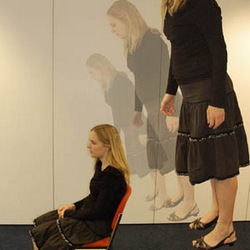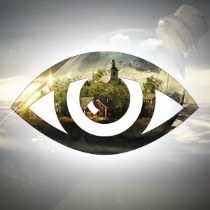Out of Body Experiences: Are OBEs Real or Lucid Dreams?
Out of body experiences (OBEs or OOBEs) involve the vivid sensation of moving outside your physical body. But are they for real or a type of lucid dream?"

OBEs are most likely to occur when you are asleep, meditating or practicing wake-induced lucid dream exercises. Indeed, many dream explorers agree that out-of-body phenomena are extensions of the lucid dream experience.
Around 1 in 10 people have experienced an OBE at some time in their lives - and some people have them frequently. There are many ways to induce an OBE and we'll look at a practical technique for doing so at the end of this article.
The Link Between OBEs and Lucid Dreams
Our scientific understanding of the OBE strongly suggests that it is a type of lucid dream.
It's no coincidence that out-of-body induction techniques are virtually identical to Wake Induced Lucid Dreams. They are virtually the same phenomenon:
An OBE/WILD begins when you're lying down, ideally having recently woken from a sleep. The body then slips back into sleep paralysis (the protective mechanism which prevents us from acting out our dreams) and the body falls asleep. However, unlike in normal sleep, the mind (your conscious awareness) remains awake.
This can give you the unusual sensation of being "stuck" in your physical body in bed, with the need to free yourself. In reality, you are already dreaming. However the sensation of sleep paralysis, plus the continuation of consciousness, tricks your body into dreaming that you are still lying in bed. Your bedroom may look exactly as normal - or there may be subtle differences, such as an extra window.
At this stage, with the conscious mind active while dreaming, we call it lucid dreaming.
The experience can be highly tactile and vivid. Lucid dreamers will attest that it can feel incredibly real, and those who genuinely believe they are having an "out-of-body experience" will have a hard time accepting that it's all "just a dream".
To complete the transition, you need to use your imagination to swing, float or roll out of your body - which still feels like lead thanks to the effect of sleep paralysis.
Other dream characters (often perceived as ghosts, spirits, aliens or even demons) may enter your bedroom and can help or hinder your efforts. Their behavior generally depends on your own expectation and mental state.
It is also possible to "teleport" out of your body and directly into a new dream scene / OBE location. Just visualizing the desired location can lead to instant OBE travel. Of course this is not a literal teleportation of the body - but of the mind into dreamland.
Often during the WILD technique, it is possible to bypass the whole experience of going out-of-body by visualizing the lucid dream scene before you start dreaming. With your eyes closed, focus your attention on your hypnagogia and let go of any bodily sensation whatsoever. Many people find this a much smoother transition.
For detailed tutorials on learning this art, get our free course.
Near Death Experiences
Out of body experiences can also be triggered under clinical conditions where brain function is compromised - such as stroke, epilepsy, head trauma and drug use. When this happens it is more often reported as a Near Death Experience (NDE).
Symptoms of a Near Death Experience are much the same as an OBE, but with added layers of expectation guiding the experience - namely the belief that you are dying. You will likely experience a feeling of detachment from the physical body, floating upwards, a tunnel of light, and feelings of either fear or total peace.
However, the term NDE is actually a misnomer: many conditions aren't actually life-threatening (especially drug-induced NDEs such as with the use of psychedelic drugs like DMT) and with improvements to cardiac resuscitation techniques, more NDEs are reported by survivors every year.
So what causes Near Death Experiences, if they're not some profound glimpse of the afterlife?
Studies have actually measured increased activity in the temporal lobe of the brains of NDE subjects. When you stimulate this area with electromagnets, it can cause hallucinations of a supernatural variety, including sensing a divine presence or other spirit-like entities in the room.
While some people seem more susceptible to temporal lobe anomalies than others, these hallucinatory experiences are nonetheless very convincing.
Astral Projection
Astral projection (or astral travel) is an esoteric interpretation of the out of body experience that assumes the existence of a spirit.
The symptoms are much the same as an OBE: feelings of floating out of your body, meeting other entities, and experiencing the physical world from an ethereal perspective (ie, being able to float through walls and teleport around the universe).
However, the expectation principle can cause the experience of astral projection to take on a highly spiritual form. Believers in the afterlife expect to see angels, deceased spirits and even gods - and so that is often what they do see while projecting.
They may travel to different "astral planes"; layers of ethereal realities shaped by energy and light. Yet one key similarity remains: in astral projection, out of body experiences and lucid dreams, your thoughts and feelings guide the experience.
So if you imagine a friend's house, you will likely zap there in an instant. If you imagine your body back in bed, you will quickly return to it. And if you expect to see an astral chord connecting you to your body, it will doubtless be there.
Scientific Research into OBEs
In 2007, neuroscientist Dr Henrik Ehrsson at University College London deliberately induced a type of out of body experience in volunteers. The study, which was published in the journal Science, created a unique illusion that mimics an OBE.

Ehrsson used head-mounted displays to enable participants to watch a live film recorded by two video cameras behind their head. This enabled them to see their own back from the third-person perspective of someone sitting behind them.
The researcher then prodded the volunteer, while moving a second rod towards where the illusory chest was located. By giving the brain these multiple sensory cues, the volunteers reported the experience of sitting several feet outside their physical body and actually seeing it from that location.
Dr Ehrsson said: "Out-of-body experiences have fascinated mankind for millennia. Their existence has raised fundamental questions about the relationship between human consciousness and the body, and has been much discussed in theology, philosophy and psychology...
"The invention of this illusion is important because it reveals the basic mechanism that produces the feeling of being inside the physical body. This represents a significant advance because the experience of one's own body as the centre of awareness is a fundamental aspect of self-consciousness."
You can read about this study in full at Out of Body Experiences at UCL.
How to Have an Out of Body Experience
As someone who dreams every night, you've already had thousands of "out of body experiences". You just didn't know it at the time.
Think about it: any time you are exploring a dream world (lucid or not) you are roaming free, completely separately from your physical body lying in bed. This is no word play. An out of body experience is your mind, out-of-body, in an internally generated dream world. (Note: this does not mean your dreams literally take you out of body at night.)
Now here is what separates an OBE from a typical dream:
- You have a higher level of consciousness during the experience
- You initiate the experience by exiting your perceived body
The first criteria means that to have an OBE, you must be fully conscious or lucid.
This means that you have vivid self-awareness during the experience, and many or all of your senses are firing just as effectively in waking life. This is what makes it so real. In this form, any type of lucid dream can constitute an out of body experience.
The second criteria means being aware of leaving your body while it is lying in bed. Normally your dreams just launch off in a new environment. But this time you'll begin in your bedroom, in the exact same position as your physical body. In this form, only certain types of wake-induced lucid dreams constitute an out of body experience.
That's the theory out of the way - now let's do some practical work!
How to Have an OBE in 3 Steps
Step 1 - Relax Your Mind and Body
The best time to try this is around 5-7am, after you've have some good quality sleep, but are still tired enough to drop off again into prolonged REM sleep.
Lie down in a comfortable position (on your back is a popular choice).
Take some slow, controlled breaths and allow your eyes to close naturally. Try not to think about anything - just allow any thoughts to pass by in their own time.
Start your meditation routine. Beginners may find it helpful to listen to blisscoded sound on headphones, as this removes thought distractions and stimulates more relaxed states of awareness.
The initial goal is to clear and focus your mind while your body falls asleep.
Perform your systematic relaxation routine. Starting from your toes, tighten and then relax every muscle group in your body. Imagine them sinking into the bed or floating up and becoming weightless or simply going invisible. Finish by fully relaxing your face, jaw and neck where you hold most tension.
Within 5-10 minutes you should feel relaxed and dreamy, with greatly reduced awareness of your body. You may begin to feel floating limbs or that your arms are in different positions than they were previously. This is great progress!
Step 2 - Shift Your Awareness
When you have little bodily sensation left, shift your awareness away from your body and gaze into the black space in front of you.
Visualize distant stars and planets, or follow your natural hypnagogia (swirling lights and geometric patterns that hypnotize you to sleep). As you go deeper, be aware of the images arising in your mind's eye, beyond your field of vision.
This is known as "falling asleep consciously". You are tricking your body into thinking you have gone to sleep. Your brain and body have an unusual way of communicating and you are simply exploiting a little-known loophole in that process.
Don't move a muscle - stay fully relaxed and soft. (If you have an itch, it's ok to scratch it, but then track back or resume where you left off.)
At this stage you may feel the effects of sleep paralysis, as if there is a lead weight moving over your body. Let it come, knowing that you are now very close to an out of body experience. However, some people never feel this stage at all, because their awareness is already focused well beyond the physical body.
As your mind wanders further into the blackness, you may be startled by a loud vibrating or humming noise inside your head!
This is just another phase in the out-of-body process. Think of this as the static noise on a radio between two frequencies. It is likely a communication from the brain asking if you are still awake, so go against your instinct and just ignore it.
(Actually, the first few times this may be very difficult to ignore because it can be deafening. But you'll soon get used to it and realize nothing bad happens.)
Step 3 - Move Out of Body
The vibrations soon pass and once that happens, you will be set free into your dream world.
You may find you already have an arm or leg free, are fully floating above your body in bed, or that you've rolled across the bed and fallen onto the floor!
Don't worry - your real body is lying in bed sleeping peacefully. This early movement can be very confusing but stay with it or you may wake up. If you find you are still "stuck" in your body, remember that you are now in a lucid dream world, where your thoughts become extremely powerful and control all your movement. Use one of the following methods to leave your "paralyzed" body:
- Float out - visualize your viewpoint has risen a few feet into the air
- Swing out - visualize a swing forming long arcs as you gain momentum
- Sink out - imagine your dream body slowly dropping through the bed
- Roll out - visualize yourself turning on your side and rolling over
- Teleport out - imagine another location and engage your senses
If you haven't already, you will naturally regain your vision when your awareness moves out of body.
If things appear blurry - just ask for clarity. Say out loud to your lucid dream "Clarity Now!" and look closely at the room in detail. You may even be able to validate the fact that you are dreaming by checking minor details in the room.
Meeting Entities During OBEs
As we now understand, the temporal lobe is more active during out of body experiences and lucid dreams.
So if you are more prone to spiritual or religious beliefs, then you are more likely to encounter a presence in your bedroom. Spirits, angels, the ghosts of loved ones and even demons may materialize to observe, help or hinder your quest.
Remember, these are dream characters. Their behavior is fueled by your expectation!
So if you expect them to be malevolent, they likely will be. The best response is to accept their presence and welcome them into your dream. They are a part of your own unconscious mind. Embrace them, sing happy songs at them, laugh with them and ask for their help. They will gladly oblige.

Out of Body Tutorials
Want to learn more about OBE induction?
Check out 10 Steps To Lucid Dreams for extensive and detailed lessons that will teach you how to induce lucid dream and OBE states on demand.
Final Thoughts
What happens once you are out of your body?
Most people fly and have lucid dream adventures. Either somewhere loosely based on the physical world, or in a fantasy universe, taking them to Candyland and back!
There are many books written by advanced OBE explorers, describing their induction process and their out of body travels. I found Journeys Out of The Body by Robert Monroe particularly fascinating.
It relates how Monroe, a doctor in the 1950s, began having involuntary OBEs and first thought he was going mad. As he tries to make sense of events from a rational scientific view, the convincing nature of his dreams led him to take a spiritual perspective of his experiences beyond the body.
Monroe has since passed and many now conclude that his experiences were internal dream worlds - but they are none the less intriguing accounts of OBE-exit lucid dreams.
As you read more about out of body experiences, you will encounter esoteric theories in support of life after death and astral travel.
It is a powerful trick of the mind, for sure, but don't rush to reach this conclusion. My advice is to remain skeptical until you have enough personal experience to decide for yourself.
An OBE is one scenario where believing in ghosts and ghouls will almost certainly deliver negative experiences, so it's wise to keep a cool head and take your out-of-body dreams for exactly what they are - dreams!
Intense, vivid, inspiring, profound and spiritual dreams...
But - in all likelihood - dreams nonetheless...
















